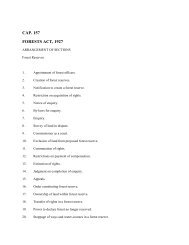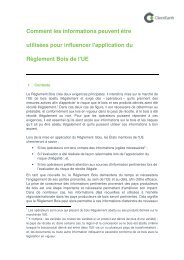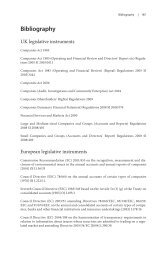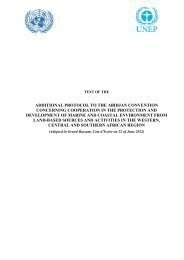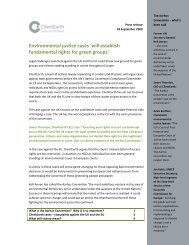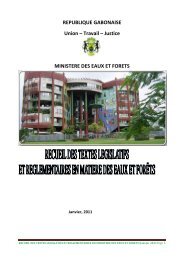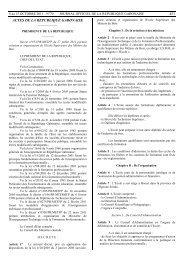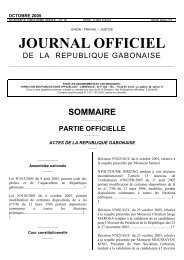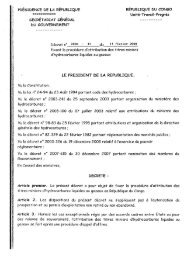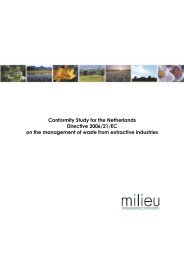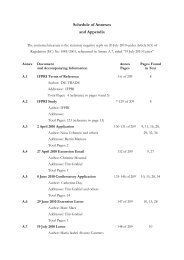Environmental and social transparency under the ... - ClientEarth
Environmental and social transparency under the ... - ClientEarth
Environmental and social transparency under the ... - ClientEarth
- No tags were found...
You also want an ePaper? Increase the reach of your titles
YUMPU automatically turns print PDFs into web optimized ePapers that Google loves.
18 | <strong>Environmental</strong> <strong>and</strong> <strong>social</strong> <strong>transparency</strong> <strong>under</strong> <strong>the</strong> Companies Act 2006Proposal 3: Regulations to consolidate <strong>and</strong> enhance <strong>the</strong> role of company AGMs | 19There is <strong>the</strong>refore a strong case for a legal mechanism that ensures greaterconnection between physically <strong>and</strong> psychologically remote companymembers <strong>and</strong> <strong>the</strong> way that <strong>the</strong>ir business <strong>and</strong> investment decisions playout ‘on <strong>the</strong> ground’. 27 The proposed reform solidifies this link, helping toreduce <strong>the</strong> detachment that can be maintained between business <strong>and</strong> itsimpacts, <strong>and</strong> making for more effective regulation of companies.Not only does this process provide scrutiny to <strong>the</strong> reporting requirementsof section 417(5)(b), it plays a broader role in providing context to <strong>the</strong>directors’ reporting process as a whole. The directors’ report is in largepart designed to help shareholders assess how <strong>the</strong> directors have performed<strong>the</strong>ir duty to promote <strong>the</strong> success of <strong>the</strong> company, 28 which <strong>under</strong><strong>the</strong> Companies Act 2006 requires that directors must act in <strong>the</strong> way <strong>the</strong>yconsider, in good faith, would be most likely to promote <strong>the</strong> success of <strong>the</strong>company having regard to “<strong>the</strong> likely consequences of any decision in <strong>the</strong>long term” <strong>and</strong> “<strong>the</strong> impact of <strong>the</strong> company’s operations on <strong>the</strong> community<strong>and</strong> <strong>the</strong> environment”. 29While in practice this scrutiny can already be provided <strong>under</strong> existinglaw, <strong>and</strong> in many important cases it is already being provided, <strong>the</strong>re are anumber of problems with this process remaining unreflected <strong>and</strong> unsupportedin law:- The law does not reflect reality or <strong>the</strong> expectations of <strong>the</strong> partiesinvolvedThe law as it st<strong>and</strong>s is artificial. In reality <strong>the</strong>se practices are st<strong>and</strong>ardprocedure for companies at <strong>the</strong>ir AGMs, <strong>and</strong> reflect dynamicsof expectation that no responsible director would seek to challenge;company directors know that <strong>the</strong>y are expected by <strong>the</strong> public at large(<strong>and</strong> indeed <strong>the</strong> law) 30 to take account of, <strong>and</strong> have sensitivity to, factorso<strong>the</strong>r than <strong>the</strong> short-term financial bottom line. That <strong>the</strong> practiceoutlined in Annex 7 remains uncodified is unacceptable: it sustainslegal fallacy that some companies may try to exploit.- There is no st<strong>and</strong>ardised procedure to control access to meetingsWithout a procedure which formally acknowledges <strong>and</strong> demarcates <strong>the</strong>right of access, abuse or over-use is an obvious possibility <strong>and</strong> practicemay lend itself to disadvantage from both individual <strong>and</strong> companyperspectives.From <strong>the</strong> perspective of <strong>the</strong> individuals who have been affected,over-use of <strong>the</strong> opportunities of access may lead to <strong>the</strong>ir submissions,however serious or concisely presented, being received by jadedshareholders (or indeed fewer shareholders - <strong>the</strong>y may be put off fromattending by <strong>the</strong> expectation of long questions <strong>and</strong> discussion). Thereis a limited amount of time in any given meeting that may usefully bespent discussing <strong>the</strong>se aspects of company activity, <strong>and</strong> so a procedureto ensure that that time is used most efficiently is to <strong>the</strong> advantage ofall parties.- Attendees receive limited supportOften <strong>the</strong> people who have been negatively affected by company activitiesmay be at a disadvantage when pitched against directors <strong>and</strong> companyrepresentatives in meetings. English is rarely <strong>the</strong>ir first language,<strong>and</strong> when confronted with commercial or legal sophistry <strong>and</strong> technicality,<strong>the</strong>y may have difficulty responding in a way that convincesshareholders of <strong>the</strong> importance of <strong>the</strong>ir perspective.Fur<strong>the</strong>rmore, <strong>the</strong>re are major logistical barriers to such people attendingmeetings in <strong>the</strong> UK; <strong>the</strong> attendant travel <strong>and</strong> subsistence costs areoften significant.Often in practice this advocacy or logistical support is provided bynon-governmental organisations or concerned individuals who arealready stretched for resources.- There is a need for enfranchisement in relation to electronic meetingsPhysical company meetings are decreasing in relevance, for twomutually precipitating reasons. First, especially in <strong>the</strong> case of largepublicly-traded companies, attendance at AGMs is not necessarilyhigh. Increased shareholding by institutional investors, advances incommunications technology encouraging <strong>and</strong> facilitating physicallyremote shareholding, or a number of o<strong>the</strong>r factors, may contributeto this. Secondly, partially as a result of this trend, <strong>and</strong> advances intechnology, <strong>the</strong>re is a movement towards <strong>the</strong> use of electronic communicationtechnology to conduct <strong>the</strong> business of meetings.This development is reflected in <strong>and</strong> enabled by recent <strong>and</strong> forthcominglegal reform. The Companies Act 2006 included a number of



